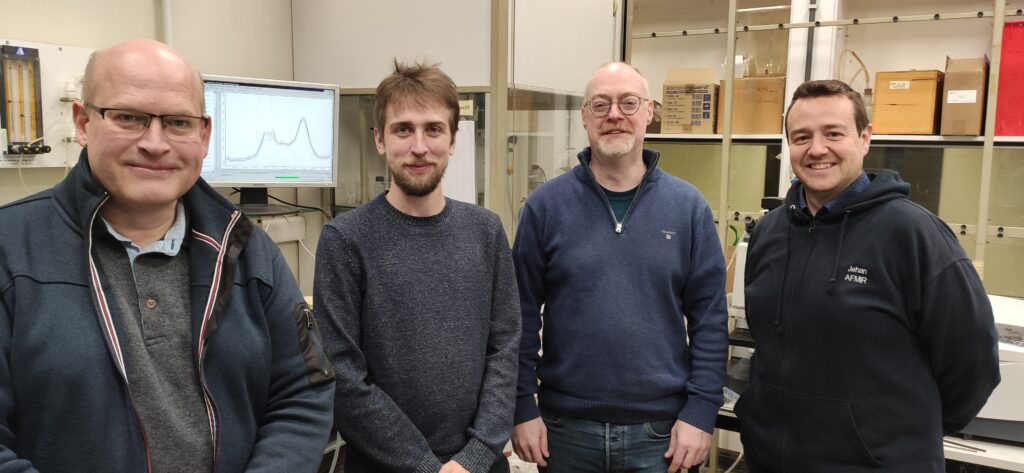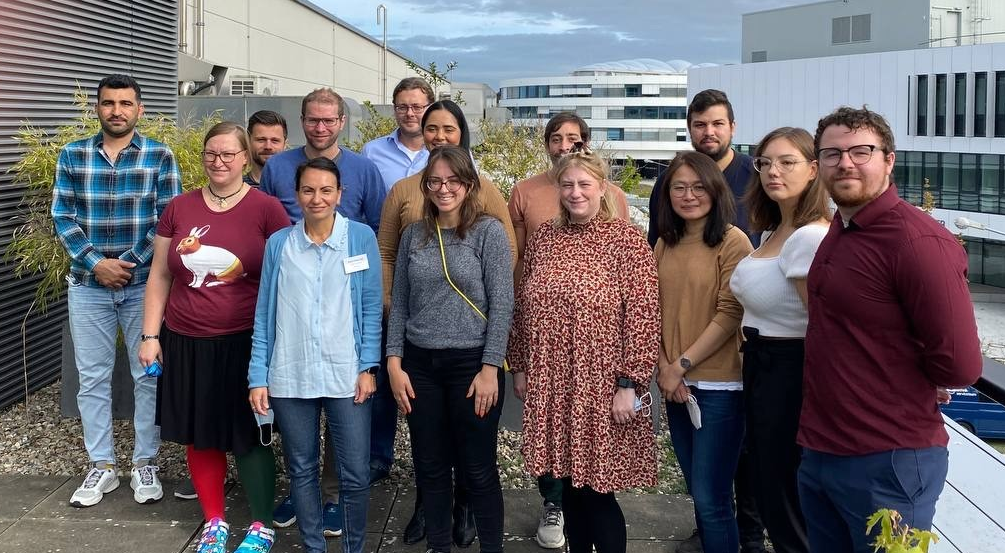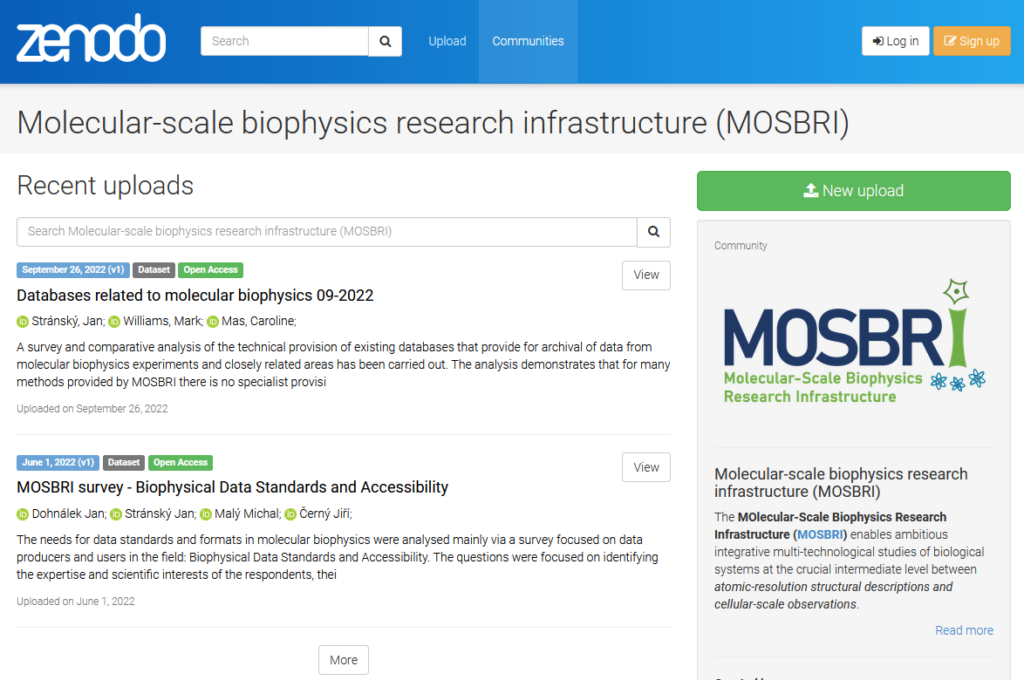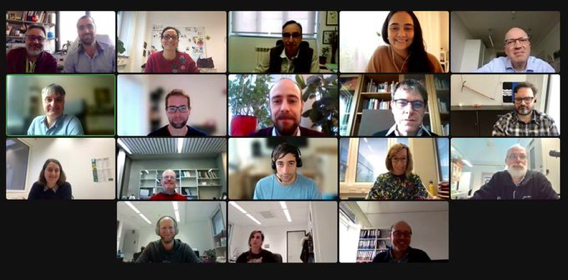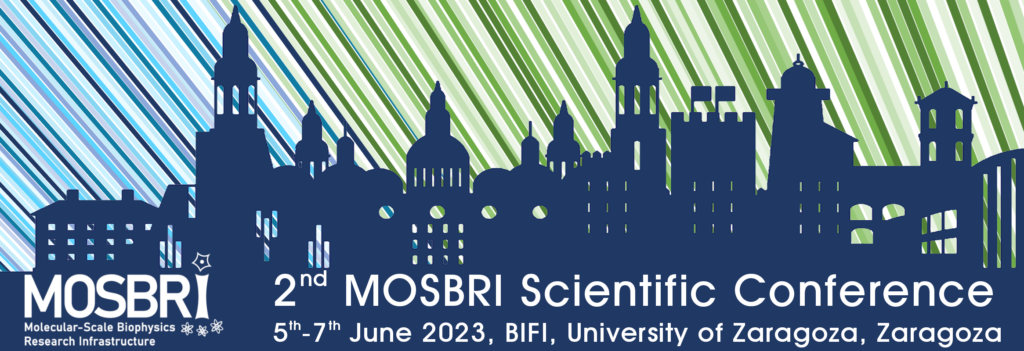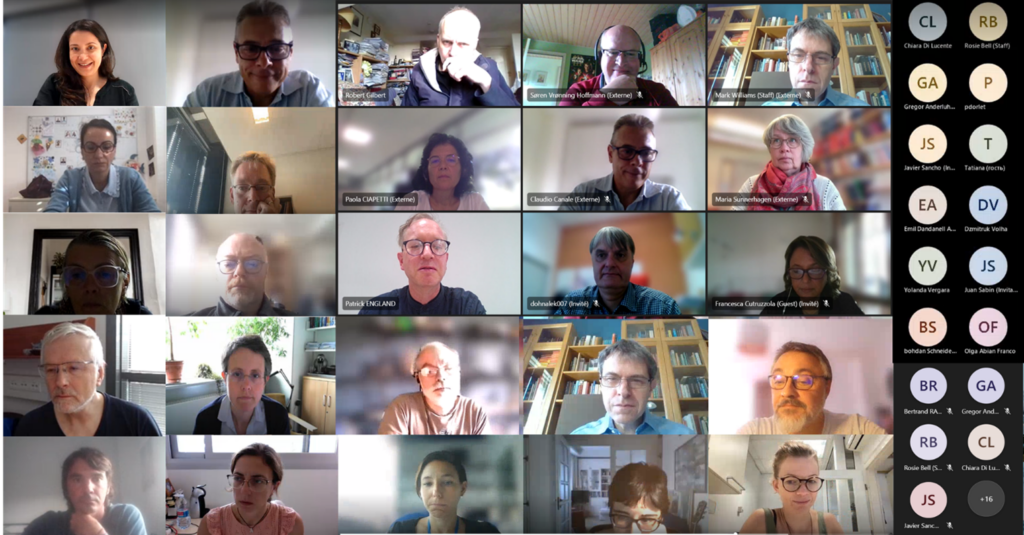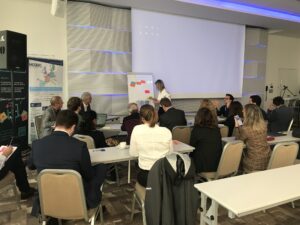
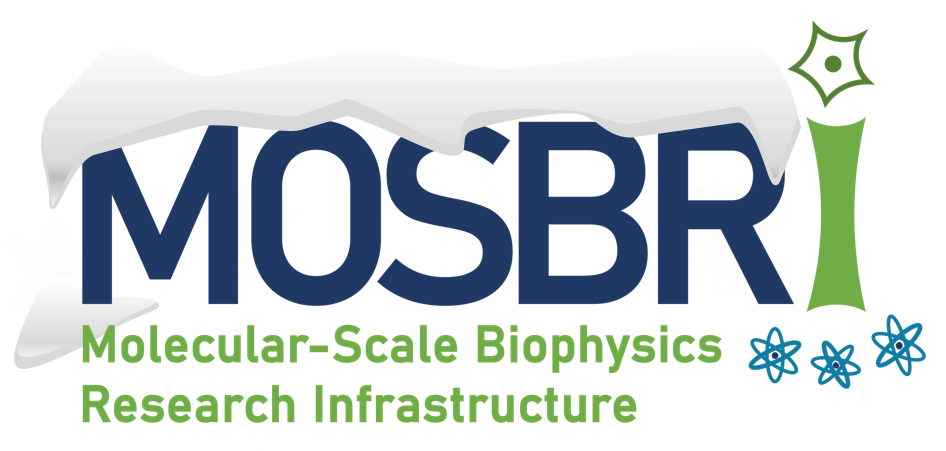 MOSBRI Newsletter – December 2022
MOSBRI Newsletter – December 2022
An excellent choice: membrane protein structure using FTIR at ULB.
MOSBRI partner Université Libre de Bruxelles (ULB) hosted both a transnational access (TNA) user visit and a MOSBRI staff exchange in the middle of November. During his TNA visit, Florian Turbant from Université Paris Cité worked on a project using FTIR to study the interactions between the C-terminal region of an amyloid with lipidic membranes of various compositions. FTIR in combination with a diamond-based ATR (attenuated total reflectance) setup is especially suitable and sensitive to membrane protein studies, including the monitoring of kinetics. ULB is an excellent choice for this research and has a long history in membrane protein research, as well as in studies of amyloids and other aggregated proteins.
The MOSBRI TNA manager visited ULB under the MOSBRI staff exchange programme to learn more about their excellence in FTIR, an important molecular-scale biophysics methodology, to launch a promotion campaign for TNA and to explore synergies for the benefit of TNA users between the ULB and AU-SRCD (Aarhus, Denmark) TNA sites. Both FTIR and Synchrotron Radiation (SR) based Circular Dichroism (CD) are excellent tools for secondary structure analysis of complicated samples as e.g., membrane proteins. You can read more about the two TNA sites on the MOSBRI partner webpages.
In particular, ULB have developed a more straightforward linear regression method for secondary structure analysis compared to the traditional peak fitting-based method, which notably is concentration independent. ULB also offers access to high throughput analysis of proteins via a combination of microarrays with state-of-the-art FTIR imaging as a unique tool, allowing as little as one monolayer of protein samples in a less than 100 μM sample size to be fully analysed. If you are interested in free-of-charge transnational access to ULB to exploit this special expertise, you can apply via https://www.mosbri.eu/apply-for-tna/. Here you also have the option to simultaneously apply for access to both SRCD and FTIR and fully utilize the complementarity between these two biophysical methodologies for secondary structure determination.
A MOSBRI course on “Quality control for integral membrane proteins” took place in Hamburg, 12th – 14th September 2022.
Nine participants from seven countries (Denmark, Netherlands, United Kingdom, France, Poland, Sweden and Hungary) attended this 2-day course at EMBL-Hamburg. The main goal of this course, hosted by Maria Garcia-Alai, was to address sample preparation of integral membrane proteins and their complexes using a biophysical quality control pipeline, prior to single particle cryo-EM grid preparation. The programme included tutorial lectures, instrument demonstrations and practical sessions covering: Nano- differential scanning fluorimetry (NanoDSF), Mass Photometry (MP), Dynamic Light Scattering (DLS) and a tour to the Cryo-EM facilities in the Centre for Structural Systems Biology (CSSB).
MOSBRI community in Zenodo.
MOSBRI recognises and pushes forward the importance of Open Science and the FAIR principles. Placing scientific results in their proper context is a fundamental part of a scientific article. Unfortunately, attempts to place raw data in a proper context, i.e. providing rich metadata information about how the data was generated and which chemical species were investigated, are still at a very early state. As a consequence, high-quality data which was painstakingly measured ends up on thumb-drives in desk drawers rather than becoming starting points for developing new hypotheses, becoming part of meta studies, or being used for training and artificial neural networks. To address this, MOSBRI is developing formats for standardising scientific metadata as well as a data repository for public storage and retrieval of data*.
In the meantime, we encourage our colleagues to publish data in general-purpose, open repositories like Zenodo. With the aim of highlighting the work carried out within and with the help of MOSBRI, we have created a MOSBRI community in Zenodo. Results of the project’s joint research activities are already deposited there, and MOSBRI TNA users, collaborators and other members of the biophysics community can use this platform to share their data.
To browse data within the MOSBRI community, use the following link: https://zenodo.org/communities/mosbri/
To share your data directly with the MOSBRI community follow: https://zenodo.org/deposit/new?c=mosbri
*If you are interested in contributing to the development of this community, do not hesitate to contact us at mosbri-data@ibt.cas.cz
MOSBRI consensus meetings, a starting point for future benchmarking activities on DSF and quality control of protein complexes.
A consensus meeting on Differential Scanning Fluorimetry (DSF) took place in virtual format on the 17th of November after the MOSBRI Workshop “Pushing the limits with Differential Scanning Fluorimetry”. During the workshop, 70 academic and industrial participants joined to discuss and discover new approaches to biomolecular characterisation studies using DSF, with three instrument-developing companies involved (Nanotemper, UnchainedLabs and Applied Photophysics).
The consensus meeting prompted a lively discussion among experts with background in molecular biophysics (from the MOSBRI and ARBRE communities) about future benchmarking activities. Two different needs were identified: namely a better approach for data analysis and a benchmarking of different instruments to assess reproducibility and repeatability.
The MOSBRI consensus meeting on “Quality control for macromolecular complexes” took place in hybrid mode in Heidelberg on the 2nd of December after the EMBL course “Quality control for downstream applications”. The discussion panel was composed both of people involved in the previous ARBRE-MOBIEU led protein quality control endeavours and by newcomers with different expertise in protein production, biophysical characterization, data management and electron microscopy. At the end of the meeting a first draft of guidelines for the quality control of complexes was generated. A second virtual meeting will be organized in January 2023 to finalise the guidelines and to decide on data formats. Afterwards, the guidelines will be tested and benchmarked.
The 2nd MOSBRI scientific conference in Zaragoza, Spain, 5th to 7th of June 2023.
Registration will open in January 2023
The conference will showcase how the MOSBRI consortium addresses a wide variety of life science research questions and how the academic and industrial research community are increasingly interested in employing biophysical techniques to unravel the structural and functional characteristics of biomolecular assemblies.
The MOSBRI 2023 conference will include:
- Presentations from partners and Scientific Advisory Board members of MOSBRI.
- Invited experts in molecular biophysics.
- Scientists who have benefitted from the MOSBRI Transnational Access (TNA) programme.
- Convivial poster sessions to promote the dissemination of research results and networking among attendees. Some posters will be selected for oral presentations.
A full list of speakers and the programme will be communicated soon.
- A significantly reduced registration fee (€150 instead of €240) is offered to students and post-doctoral fellows up to 2 years after the defence of their doctoral thesis.
- Bursaries are offered to students and postdoctoral fellows, covering the registration fee plus 2 nights of hotel accommodation. Apply by sending a short CV (2 pages maximum) and a letter of motivation to mosbri23@bifi.es before the 15th of April 2023.
For more details visit the conference website:
https://www.mosbri.eu/events/conferences/zaragoza-2023/
In other news…
Second MOSBRI General Assembly– September 2022
The 2nd general assembly took place on the 14th of September 2022, with 39 members from the 15 MOSBRI partners and 3 members of the Scientific Advisory Board (SAB) gathered online. The project progress and the deliverables submitted to the European Commission during the first year of the project were presented. The next MOSBRI general assembly will take place in June 2023 as a satellite event of the MOSBRI 2023 conference in Zaragoza, Spain.
MOSBRI co-organised a side event about Research Infrastructure sustainability during the ICRI2022 meeting in Brno.
MOSBRI, the European Science Foundation, Europlanet and VITALISE organised a side event on the 19th of October in the frame of the ICRI2022 conference in Brno, Czech Republic. This event brought together ‘distributed’ Research Infrastructures developed under Horizon 2020 and previous European Commission framework programmes. 156 people registered, 85 on-site and 71 online. Read more about this event on the website.
If you wish to receive our next Newsletters, go to https://www.mosbri.eu/news/ to subscribe.
The MOSBRI website will also provide you with more information about the network partners, services offered, training and many other activities of the MOSBRI programme.

